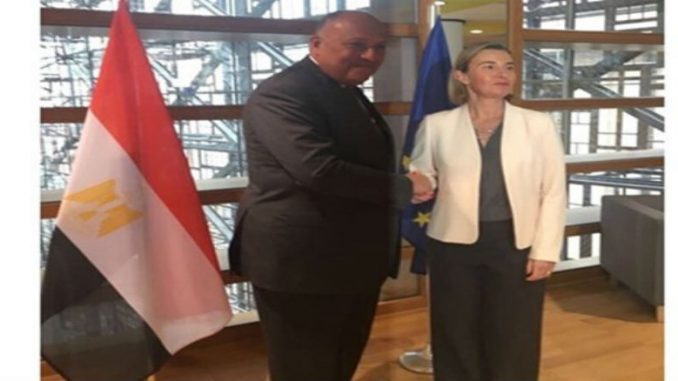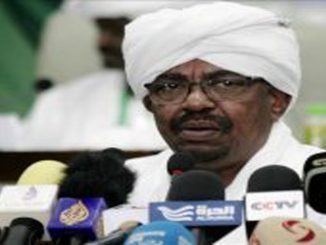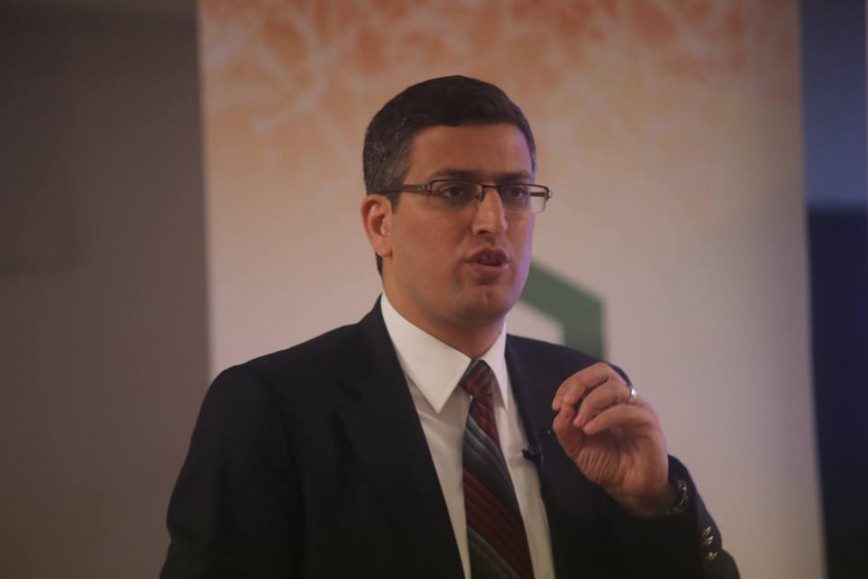
Egypt is enhancing its economic relations with Europe amid the country’s need to revive its wrecked economy.
In this context, Egypt’s Foreign Minister Sameh Shoukry traveled to Brussels on a one-day visit where he met with the 28 foreign ministers of the European Union.
During Shoukry’s meeting with his EU counterparts, Egypt’s FM gave a detailed explanation and updates on Egypt’s domestic affairs, in particular Egypt’s current economic reform program.
Egypt aims to bolster its economic relation with the European institution.
In February 2016, an EU-Egyptian association agreement was negotiated based on Egypt’s 2030 development plan.
In the same context, Shoukry attended a number of meetings with high officials in Brussels, on the sidelines of the EU’s Foreign Affairs Council, which focused mainly on illegal immigration along with bilateral relations.
Egypt’s FM also met with EU commission vice-president Frans Timmermans and EU commissioner for migration and home affairs Dimitris Avramopoulos.
Shoukry also tackled with the EU commissioner Egypt’s role in Libya, which contributes to tackling illegal migration flows across the Mediterranean, pointing out that the EU is ready to cooperate with Egypt.
Moreover, the European ministers were keen on getting acquainted with the Egyptian stance towards the Libyan crises.
Economic Partnership with the EU
Economic partnership with the EU was the core of Shoukry’s visit to Brussels. The visit mainly aims to launched a new phase of strategic partnership between Egypt and the European Union, paving the way for an EU-Egypt association agreement in the upcoming period.
The agreement — which has been under negotiation since February 2016 — would frame the country’s relationship with European institutions over the next three years.
In this context, Foreign Minister Sameh Shoukry and his European counterparts have compiled a document of each side’s priorities, to guide further negotiations on the agreement, according to an official statement released by foreign ministry spokesperson Ahmed Abu Zeid.
Shoukry also discussed the 2030 Sustainable Development Strategy—announced in February 2016—as a reference the Egyptian side to negotiate on priorities of engagement with the European Union, in order to ensure the implementation of the national development agenda.
An EU delegation is set to visit Egypt mid-March to continue talks on the association agreement.
Egypt has taken extreme measures recently to revive its wrecked economy that undergoes one of its harshest crisis in the its history.
The economic conditions deteriorated in an unprecedented way under his al-Sisi’s rule.
Tourism and foreign investments, the two sources for foreign currency, have declined as a result of political instability and lack of security.
The withdrawal of the two main sources of foreign currency led to a severe shortage in foreign currency.
As a result, the Egyptian pound rate has fallen compared to the US dollar and the black market flourished on the currency expense and led to inflation.
Last November, the International Monetary Fund’s executive board approved Egypt’s request to secure $12 billion loan facility after Egypt met its requirements.
On August 30 Egypt started its first steps towards the loan when Egypt’s parliament approved a long-awaited law introducing a value-added tax (VAT) of 13 %, rising to 14% in the next fiscal year.
On November 3, the Central Bank of Egypt floated the Egyptian pound and gave up trying to peg the currency to the US dollar allowing it to devalue by almost half.
On November 4, Egypt took another unprecedented decision, which has always been abandoned by former leaders in fear of public unrest, to cut subsidies for fuel leading to jump in prices.
However, despite taking all these drastic steps, the IMF loan alone won’t help as the North African country still needs to revive its internal sources to allow the flow of foreign currency within the country and thus, stabilizes its currency and contains its inflation rate.
It is noteworthy that the inflation rate has hiked recently after floating the Egyptian pounds.
According to a statement issued by the Central Agency for Public Mobilization and Statistics (CAPMAS), the annual Inflation rate hiked to 24.3% in December, compared to 20.2% in November.
The statement attributed the increase of the inflation rate to price hikes in the food and beverage sector, as they registered an increase of 29.3%, representing a 15.12% increase in the Consumer Price Index (CPI).
Egypt and the NATO Enhance Cooperation
Security partnership between Egypt and the EU has been traced recently.
Excessive activities have been held recently between Egypt and the NATO to discuss security issues in the region, illegal migration and the Libyan crisis.
On the sidelines of the EU’s Foreign Affairs Council, FM Sameh Shoukry held talks with NATO secretary general Jens Stoltenberg in Brussels, in which their talks touched on the various security challenges threatening the region.
During the meeting, Stoltenberg listened to the Egyptian vision about the crises in the region, particularly Egyptian efforts to bring stability and peace to Libya.
The meeting also touched on the role of NATO to combat illegal migration in the Mediterranean area, and efforts to combat terrorism in Egypt and the region.
He also reviewed various aspects of the Egyptian vision concerning the issue of combating terrorism, pointing out the importance of fighting against extremist ideology and drying up the sources of financial and logistical support for terrorist organizations.
Both parties also expressed their desire of strengthening and developing their relations to support the Egyptian goals and work together to address security challenges in the region.
It is worth to mention that the NATO created diplomatic representation in Egypt for the first time.
In the same context, Egypt’s army chief-of-staff, General Mahmoud Hegazi, met with General Petr Pavel, the chairman of NATO military committee in Cairo to discuss the latest regional developments, the Egyptian armed forces announced.
It is worth to mention that Egyptian chief-of-staff is currently on the Egyptian commission mediating between rival Libyan factions. In the last months, Cairo hosted several talks between rival political powers in the war-torn country.
Moreover, the two military commanders also discussed the latest developments in the war on terrorism as well coordination and cooperation in that field.
In this context, General Pavel expressed his appreciation for the Egyptian role and efforts in fighting radicalism and terrorism, stressing NATO’s complete support for those efforts to achieve security and stability in the Middle East, according to the statement.
The meeting between Pavel and Hegazi was attended by a number of Egyptian armed forces commanders.
FM Shoukry Focused on Economic Rights and Egypt’s Strategic Role Rather than Human Rights
During Egypt’s Foreign minister visit to Brussels, he was keen to portray Egypt’s important role in the region regarding the Libyan crisis and the illegal migration issue, aiming that the European institution turns a blind eye on human rights violations in the country.
Egypt has become one of the dangerous spots used by migrants to sneak to European borders. Bigger boats are increasingly setting out from Egypt for sea voyages of up to 10 days toward Italy, as the EU, NATO and Turkish coast guard tighten controls in the Aegean Sea after Brussels and Ankara reached a deal to keep refugees in Turkey in exchange for 6 billion euros in aid and eventual visa-free travel for Turks visiting the EU.
In addition, the continuous turmoil in Libya posts a direct threat to Europe as terrorist groups can easily flow through untighten borders to carry out attacks in Europe.
In the same context, Shoukry mainly focused on on economic, social and political developments in Egypt and the challenges the country faces in each of these sectors, highlighting that human rights issue include also social and economic rights.
Shoukry said to his EU counterparts that “Egyptian national institutions bear the responsibility of safeguarding human rights in Egypt,” adding that “human rights include social and economic rights; they are not restricted to political rights.”
Accordingly, Egypt wanted to send an implied message that human rights aren’t only limited on freedoms and NGOs rights but on other issues that should be the EU’s point of concentration.
Since al-Sisi led a military coup in 2013 against Egypt’s first democratically elected president Mohamed Morsi, the Egyptian authorities have engaged in one of the widest arrest campaigns in the country’s modern history, targeting a broad spectrum of political opponents.
According to Human Rights Watch and local rights groups,” Between June 2013 and May 2014, Egyptian authorities arrested or charged at least 41,000 people, and 26,000 more may have been arrested since the beginning of 2015.”
Hundreds of Egyptians were imprisoned, abducted, and tortured under al-Sisi military regime. Many have died because of torture and medical negligence in Egypt’s prisons. Amnesty International has released a report in July 2016 saying that hundreds of Egyptians have been forcibly disappeared and tortured in a “sinister” campaign to wipe out peaceful dissent in the most populous country in the Arab world.
Giulio Regeni, the Ph.D. student who was doing postgraduate research into Egyptian trade unions, disappeared on the fifth anniversary of January Revolution.
The Cambridge University student’s body was found brutally tortured in a roadside ditch on the outskirts of the Egyptian capital, on February 3, 2016.
His mother said that she could only recognize him by his nose.
Torture found on Regeni’s body showed the signs of Egypt’s security forces which are known for using violence against detainees to gain information and confessions.
Amnesty report pointed out to Giulio Regeni’s case. Amnesty’s Felix Jakens says, “The terrible injuries sustained by Giulio Regeni are similar to those suffered by numerous people interrogated by the Egyptian security forces – his case is just the tip of the iceberg.”
“We fear Regeni was abducted by state agents and tortured to death, and until we get a thorough independent investigation into his death those suspicions are only going to grow.”



